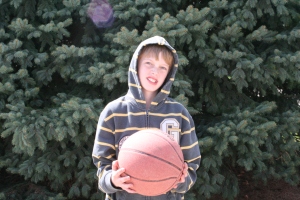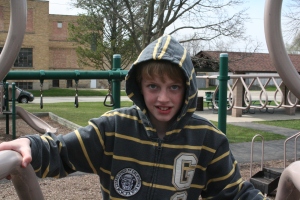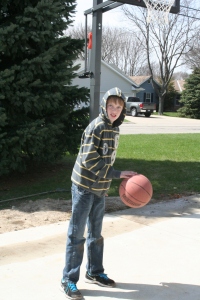
Many WordPress bloggers have shared their vicarious and first-hand experiences with autism. A number of books attempt to describe the autistic experience through fiction and there are many films dealing with this topic. Below, Keri J. Johnson, one of my Carroll University research students shares her observations as a mother.
According to Autism Speaks a staggering 1 in 68 children are diagnosed with an Autism Spectrum Disorder (ASD), with an even higher amount of boys with 1 in 42. Raising and caring for a child on the spectrum is challenging both emotionally and physically. All any parent wishes is the best for their child, and when you see your child struggle it can be heartbreaking. This is my journey raising a child with ASD.
Tyler speaks…
My son, Tyler is a charming boy with a bright future. He likes to play video games, watch television, swim, and play sports. He is passionate about weather, and can name all the clouds in the sky. He has an endearing quirkiness about him that you will notice as soon as you start talking to him.
When Tyler turned two years old I noticed he did things differently than other children his age. Although he could speak well, he did not comprehend what others were telling him. For example, he would understand if you asked him if he wanted something to eat, but if you told him to put the block on top of the table he would give you a blank look. I also noticed at playgroups that he would play differently than other children his age. Instead of driving the toy cars around on the floor, he would line them up. Also when the other kids were playing in a preschool playhouse Tyler just kept opening and closing the door as if he needed to know how the door was put together.
I knew all children at his age had tantrums, but Tyler’s were different. They were full-on meltdowns that could last for over an hour, and would leave both him and me completely exhausted. Looking back now I can see these episodes as having been red flags, but at the time I didn’t recognize them as such. I made excuses for him saying to myself and to others that he was just very passionate with a very analytical mind—maybe a future engineer. I decided to bring the subject up at his next doctor’s appointment, in hopes that the doctor would ease my concerns.
I took Tyler to his three year well-child checkup and communicated my concerns to the pediatrician’s attention. I point blank asked the doctor if he thought it was possible that Tyler was autistic. He said that he believed it was very possible.
With this diagnosis my world stopped. I came home from the appointment and cried. As a parent you have so many hopes and dreams for your children, and when you get a diagnosis such as this all you can think of is what kind of future will they have. Needless to say I was very angry, but I knew I needed to do everything I could to help him. I had to learn everything I could about autism.
I enrolled him into an early childhood school program and he was assigned both an occupational therapist and a speech therapist. Things were not always easy for Tyler; meltdowns ranged from 10 to 60 minutes and were extremely exhausting for everyone.
By the time Tyler was in elementary school I was getting called every day to come and help calm him. I would hold him in my arm and just rock with him back and forth until the meltdown would subside. Sometimes the meltdowns were so bad that I would break down and start crying right along with him. Anything and everything could trigger a meltdown such as smells, sounds, and having to wait in line. He would always feel miserable afterwards, and I knew I had to find a way to help him.
I looked to no avail for therapists who would work with children with mild autism. Frustratingly, there was just no one who was willing work with him. I felt abandoned and completely alone, but I never gave up. I started to research different calming and coping techniques that I could teach him.
Social stories were a huge success, because he was able to learn how to cope in different situations. I found that tickling his arm and back soothed him and could stop a meltdown before it started. Schedules were also very important, and seemed to agree with him. I had made him a schedule that told him what he needed to do from the time he woke up until he went to bed. I discovered that he had a need for constant manipulation. He learned how to finger knit, and the feeling of the yarn and the movement of his fingers helped soothe him.
As a result of these interventions, Tyler was doing really well at home, but school was still very hard on him. His anxiety over homework, tests, and talking to other students made for very hard days, and he would come home emotionally exhausted. It was very sad because he knew he did not want to act that way.
Tyler would ask me why he was like this, and why was he different than the other kids. These questions broke my heart. It was hard as a parent to see him this way because I knew he had so much potential. His teacher suggested I look into putting him on medications. I was extremely upset that she would suggest such a thing, and I fought it for several months. However, I eventually decided it might be the best thing for him.
Tyler went through over a dozen different types of medication with many different side effects until we found some that worked for him. Although he seemed to be doing better on meds, I often wondered if I was doing the right thing. I felt that they were just a bandaid or temporary fix, and that he might never learn how to cope on his own. I wanted him to be able to self-soothe without relying on medication.
During fourth grade I started to read about the benefits of a gluten free diet. I really wanted to find an alternative to medication, and thus we started our gluten free journey. I am not going to lie; the first couple months were extremely difficult, but I knew we needed to stick with it. After three long months I started to notice a difference in Tyler. His anxiety was lower, he was happier, and his meltdowns were nonexistent.
Fifth grade was very good for Tyler. He was happy, had good grades, and not one meltdown the entire year! I was thrilled for him.
He is now almost finished with the sixth grade, and has been medication free for over a year. He is still gluten free, and doing wonderfully. It has been a long journey, but we never gave up.

Keri J. Johnson will graduate from Carroll University on Mothers’ Day, May 11, 2014. She is writing a book about her lessons learned with Tyler.

